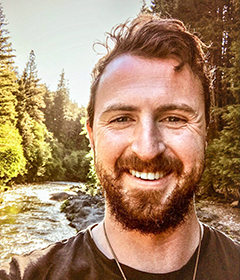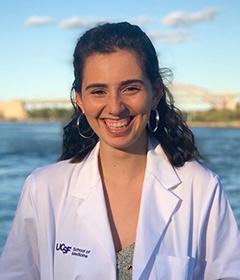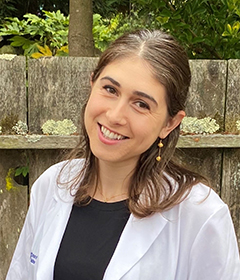November 16, 2023

James Earl Schier Nolan, M.P.H., directs the Center’s Community Engagement Core and helps mentor the scholars. (Photo courtesy of James Nolan)
James Earl Schier Nolan, M.P.H., directs the Center’s Community Engagement Core and helps mentor the scholars. (Photo courtesy of James Nolan)
Environmental health education is often missing from the medical school curriculum, leaving healthcare professionals unprepared to address the many ways the environment can affect patient health. To bridge this gap, the NIEHS-funded Environmental Health Sciences (EHS) Core Center at the University of California, San Francisco (UCSF) created the Environmental Scholars Program (ESP). The program helps doctors and nurses identify and address health issues stemming from environmental exposures and a changing climate.
“Future doctors and nurses typically receive little training on pathways of contaminant exposure in the body, or how exposures affect patients’ health. These exposures have greater impacts on pregnant people and children,” said James Earl Schier Nolan, M.P.H., who leads the program. “At the same time, many of these exposures could be prevented with no-cost, or low-cost, interventions and behavior changes. The University of California, San Francisco, in collaboration with community partners, is closing the clinician training gap through the three-year, paid Environmental Scholars Program.”
In addition to coursework and guidance from ESP mentors, the program emphasizes community engagement. Each scholar is paired with an environmental organization, community clinic, community health organization, or researcher to work with underserved communities facing environmental exposures. The scholars complete a 200-hour summer internship with their organization, working on a special project.
Inspiring New Career Goals

Fernández plans to practice obstetrics and gynecology. Her ESP work focuses on wildfire smoke exposure and pregnancy. She approaches this work through an environmental justice lens, examining how maternal indicators like insurance source, education level, and the experience of racism, impact health outcomes. (Photo courtesy of Anna Fernández)
Fernández plans to practice obstetrics and gynecology. Her ESP work focuses on wildfire smoke exposure and pregnancy. She approaches this work through an environmental justice lens, examining how maternal indicators like insurance source, education level, and the experience of racism, impact health outcomes. (Photo courtesy of Anna Fernández)
One ESP scholar, Anna Claire Fernández, a UC Berkeley/UCSF Joint Medical Program medical student, said, “I think it’s necessary to combine public health and medicine, because we are reaching the point in the climate crisis where health disparities will start to grow faster, and doctors will be involved. We will have to play an integral part in environmental health and justice.”
Fernández said the ESP program provided a structured opportunity to think about how the environment affects health.
Through the program, she worked with Amy Padula, Ph.D., in the UCSF Department of Obstetrics and Gynecology, investigating the relationship between wildfire smoke exposure and adverse birth outcomes. She now hopes to expand this research into her ESP capstone project. She plans to share information and resources with communities affected by wildfire smoke, highlighting how to advocate for their right to protection from smoke on the job, especially during pregnancy.
Fernández’s time as an ESP scholar has also included a chance to accompany USC EHS Core Center Director, Tracey Woodruff, Ph.D., on a trip to Washington, D.C., where Woodruff educated Congress members about the health impacts of toxic substances.
“It opened my eyes to science’s role in advocacy,” Fernández said. “I never knew scientists did that. It’s incredibly inspiring.”
After the trip, Fernández shared that she still wants to be a clinician, but also aspires to have an advocacy role.
“We take an oath to do no harm, but we can’t limit that to the clinical setting anymore,” she emphasized. “Without ESP, I would just be thinking about these issues without the knowledge and skills to do anything about them. ESP was a transformational force.”
Discovering a Sharper Focus

Leventhal hopes to become a pediatrician as well as make an impact on medical waste in the future. Through her ESP internship with Physicians, Scientists, and Engineers for Healthy Energy – a policy research institute – she examined the health risks of natural gas odorizing chemicals, an understudied environmental exposure in the home. (Photo courtesy of Olivia Leventhal)
Leventhal hopes to become a pediatrician as well as make an impact on medical waste in the future. Through her ESP internship with Physicians, Scientists, and Engineers for Healthy Energy – a policy research institute – she examined the health risks of natural gas odorizing chemicals, an understudied environmental exposure in the home. (Photo courtesy of Olivia Leventhal)
Olivia Leventhal, ESP scholar and UCSF medical student, spoke about how the program has given her interest in global health a focal point.
Leventhal and her family run a nonprofit that funds a rural Tanzanian community’s primary school. Through 10 years of visits, Leventhal has witnessed stark climate change effects, with more extreme cycles of drought and flooding threatening the community’s food supply.
“I saw the impacts of climate change earlier in Tanzania. That has driven me to pursue understanding the health impacts of climate change, and also to find ways to reduce the healthcare industry’s impact on climate change.”
Her participation in ESP has helped her zoom in on combatting climate change through waste reduction.
“I really like doing my part as a healthcare provider to reduce waste. It impacts not just one local community, but everyone.”
She pointed out hospitals and clinics are major sources of trash, because of widespread use of disposable equipment for procedures and treatments. Every tool must be sterile, so it is easier and cheaper to use single-use equipment. She also noted that much equipment is thrown away without ever being used.
Leventhal is now working on her ESP capstone project, a waste audit for pediatric laceration-repair kits. She is using her medical knowledge to show which tools in the kits may not be necessary and which could be replaced with reusable or more sustainable alternatives.
“Becoming a leader in healthcare sustainability is now a career goal of mine, which was definitely not something I was even aware of before ESP,” she said. “Now, I'm really passionate about it and want to continue doing this work.”
Widening Horizons
Now, ESP staff are developing an elective course for the UCSF School of Medicine, to spread basic environmental health knowledge more broadly among the students. Nolan hopes to build a roster of inspirational guest speakers, to show the students how different areas of environmental health overlap with the medical field.
Moving forward, Nolan and the team hope to collaborate with other EHS Core Centers and organizations to expand the program model.
“We hope that every medical student gets that emphasis on the vital importance of environment, not only in current health, but also in the future. We’re planning for that next generation – or the next two or three generations,” Nolan said.


